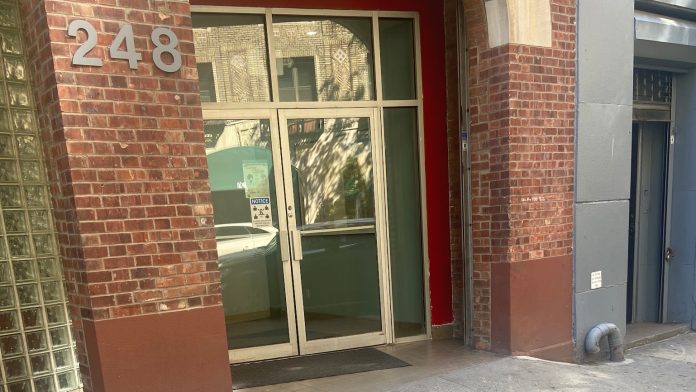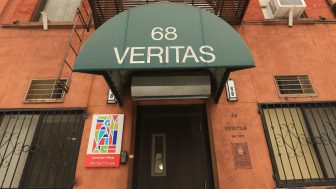The Bridge
248 West 108th Street
New York City, NY 10025

About The Bridge
New York City, New York, is home to the stock exchange and a wide variety of business headquarters. It’s also home to The Bridge Mental Health Clinic, which is part of the Ryan Health network. They provide outpatient programs and supportive housing in the city. Service includes mental health treatment and substance use recovery.
The Bridge takes in all clients regardless of their finances. I think they likely also accept Medicaid coverage and may take other insurance.
The Bridge in The Big Apple
Treatment at The Bridge’s Certified Community Behavioral Health Clinic (CCBHC) includes individual and group treatment to address mental health and/or addiction issues.
There’s also a Personalized Recovery Oriented Services (PROS) program that helps clients learn coping strategies and living skills to help them move toward independence. There’s also a harm reduction focused program from Center for Wellness and Change and an impaired driving education program for DUIs.
Comfort From Community Based Services
Some people aren’t comfortable in a clinical setting, and I like how The Bridge provides services in more familiar environments. They provide care coordination, psychiatric and vocational services, and connections to other care.
They even have a mobile behavioral health and addiction treatment unit and housing placement services within the community.
Amenities
Addiction treatment in the metro area benefits clients by offering seamless connections from the city, around the state, and those seeking out-of-state treatment. Another benefit of attending a metro area drug rehab is that you’re close to major airports and ground transportation services.
Addiction Treatment Programs
While at a young adult program in New York, young people can participate in activities and therapy sessions that cater to their age bracket. They can also form relationships with other young adults for mutual support.
A quality adult program in New York provides a combination of medical, mental, and emotional support to treat the whole individual. Various methods are used to help adults achieve and maintain sobriety.
To address the full range of issues involved in alcohol use disorder, an alcohol rehab in New York often incorporates a variety of treatment methods. Physical activity, nutrition, psychotherapy, and support groups are common aspects of treatment.
Some men benefit most from men’s rehab in New York. These programs understand the unique challenges that men face when struggling with addiction, and they offer personalized treatment to address these challenges.
Men and women face different issues when it comes to addiction and recovery. Women’s rehab in New York offers treatment approaches that address life issues that are specific to women.
There are many options available for opioid rehab in New York. Treatment programs include detox, inpatient rehab, outpatient rehab, or intensive outpatient programs (IOPs). Consider the severity of your addiction, how long you’ve been addicted, and personal history to determine which type of program is best for you.
Cognitive behavioral therapy in New York emphasizes how thoughts affect mood. It is a goal-oriented method that teaches participants how to address dysfunctional thoughts and underlying beliefs that can lead to substance abuse and addiction.
During elderly rehab in New York, you’ll participate in a variety of therapies, including individual, group, and family. Common methods include cognitive behavioral therapy, 12-step methods, and case management, all with a focus on age-specific needs.
Men and women face different issues when it comes to addiction and recovery. Women’s rehab in New York offers treatment approaches that address life issues that are specific to women.
Assertive Community Treatment (ACT) is an integrative, community-based care strategy designed to address the needs of persons with severe and/or complex mental illness or behavioral disorders. ACT is typically provided by a multidisciplinary team of medical and mental health care providers, social workers, therapists, and other specialists, including addiction recovery professionals. These services are frequently provided in the home and community to clients in crisis, those who are clinically unstable, and those who are unable or unwilling to travel to a hospital or clinic for in-person treatment.
Levels of Care
For those who require accountability but less intensive oversight, outpatient rehab in New York is a good option. During this treatment, you meet regularly with a counselor and attend support group meetings, for accountability and encouragement. This may last for a few weeks or months, based on your recovery journey.
Mental health disorders that co-occur with substance abuse disorders often cause relapse. For successful recovery, both disorders must be treated, with dual diagnosis treatment in New York. Common methods include cognitive-behavioral therapy, medication management, and counseling.
Once rehab is complete, aftercare rehab in New York steps in to prevent relapse. This program gives you access to resources that reduce stress and help you successfully navigate challenges. Studies show that people who take advantage of these resources are more likely to maintain long-term recovery.
Accreditations
Contact Information
Nearby Treatment Centers

119 W 124th St
New York City, NY 10027

1475 Park Avenue
60
New York City, NY 10029

68 W 106th St
New York City, NY 10025

2090 Adam Clayton Powell Jr Boulevard
7th Floor
New York City, NY 10027